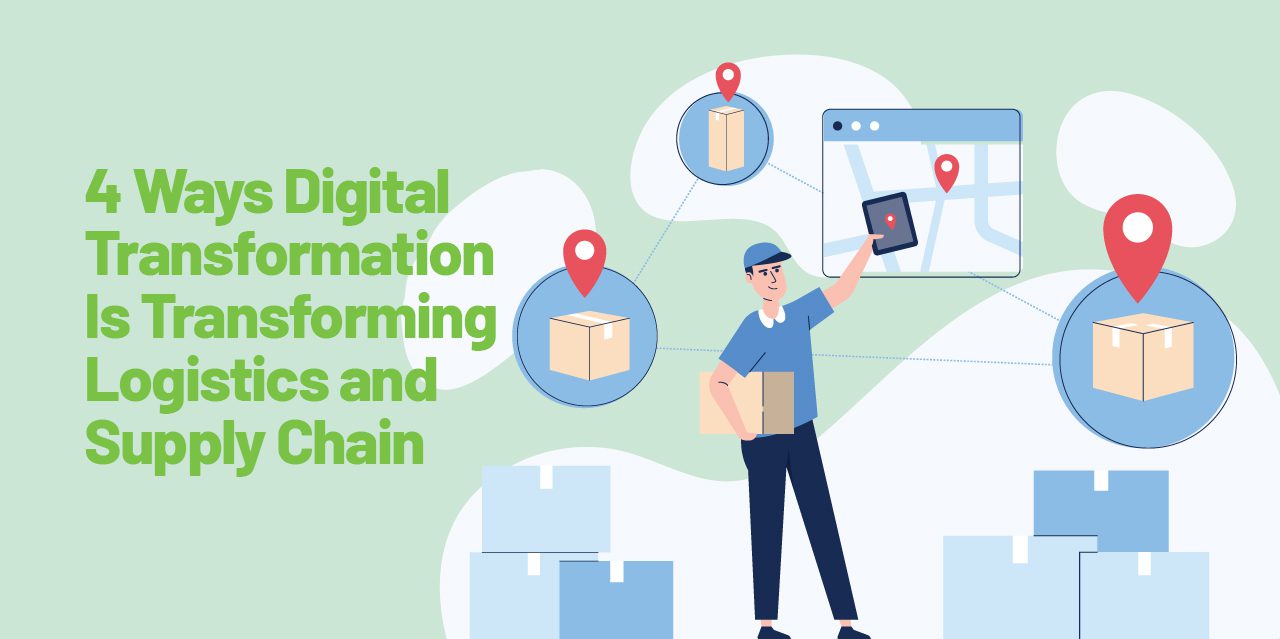Digital transformation is one of the most important trends affecting businesses today. Across all industries, companies realize that to remain competitive, they need to digitize their operations and processes. The logistics and supply chain industry is no exception.
This article will explore four ways that digital transformation is transforming logistics and supply chains.
What Is Digital Transformation?
First, let’s take a step back and define what digital transformation means. It is the process of transforming a business from its traditional, analog state to a digital one. It involves transitioning from legacy systems and processes to newer, more efficient, and effective ones that leverage digital technologies.
In logistics and supply chains, digital transformation can mean many different things, including:
- Adopting digital technologies to improve the flow of information and materials within and between organizations. This is known as supply chain management or SCM.
- Using digital technologies to improve the customer experience. This is often called customer experience or CX management.
- Integrating digital technologies into business processes to make them more efficient, is known as business process management or BPM.
- Utilizing digital technologies to create new business models and paradigms, which is often called digital business or DX.
4 Ways Digital Transformation Is Transforming Logistics and Supply Chains
Now that we have a better understanding of what digital transformation is, let’s look at how it’s impacting the logistics and supply chain industry.
1. Increased Efficiency and Productivity
The first way digital transformation impacts logistics and supply chains is through the use of digital technologies to improve operational efficiency. This is often called operational excellence or OpEx.
Traditionally, companies have been focused on reducing costs and improving profits. They have been less concerned with the efficiency of their operations. Today, operational efficiency is critical to success. Companies that can operate efficiently are more likely to succeed than those that can’t.
Digital technologies can improve operational efficiency in several ways. These include:
- Enterprise resource planning (ERP) systems that help companies manage their resources.
- Manufacturing execution systems (MES) that help companies manage their manufacturing operations. They typically include features for tracking production, scheduling tasks, and managing quality control.
- Warehouse management systems (WMS) that help companies manage their warehouse operations. They typically include features for tracking inventory, managing orders, and issuing invoices.
Digital technologies can also help companies automate their processes, leading to increased efficiency and productivity. For example, using Robotic Process Automation (RPA), companies can automate the processing of data and transactions. This can help speed up business processes and improve accuracy.
Digital technologies such as these have made it easier and faster for companies to manage their operations, and they’ve helped improve product quality and reduce costs.
2. Greater Transparency and Visibility
The second way that digital transformation is impacting logistics and supply chains is through the increased transparency and visibility it provides. Transparency and visibility are important because they help companies make better decisions. For example, by tracking the movement of goods and materials in real-time, companies can better understand where things are in the supply chain and how long it will take for them to reach their destination. This can help companies make better decisions about production and inventory management.
Digital technologies can be used to improve supply chain visibility in several ways. These include:
- Radio-frequency identification (RFID) uses radio signals to track objects. It can track inventory, manage orders, and more.
- Global positioning system (GPS): GPS is a technology that uses satellites to track objects such as vehicles, shipments, and more.
- Sensor data: Sensors are devices that can track the temperature, humidity, pressure, and other attributes of objects.
Additionally, by integrating digital technologies into their business processes, companies can better understand how their supply chains are performing. This can help them identify inefficiencies and problems so that they can address them quickly.
3. Improved Customer Experience
Today, customers expect a high level of service and they’re willing to switch providers if they don’t get it. To stay competitive, companies need to focus on improving the customer experience. Companies that focus on delivering a great customer experience are more likely to succeed than those that don’t.
Digital technologies have had a significant impact on the customer experience. They’ve made it easier and faster for companies to interact with customers, and they’ve helped improve customers’ perceptions of companies.
Digital technologies can improve the customer experience in several ways, including:
- Web and mobile apps: These are digital technologies that allow customers to interact with companies online or on their mobile devices. They can purchase products, check the status of orders, and more.
- Social media: This digital technology allows customers to share their experiences with companies and other customers online. It can be on social networking sites like Facebook and Twitter or review sites such as Yelp and TripAdvisor.
- Customer Relationship Management (CRM) systems are software applications that help companies manage their interactions with customers. They typically include features for tracking customer data, managing customer contact information, and issuing invoices.
Additionally, companies can use digital technologies to improve the speed and accuracy of their customer service. For example, companies can provide faster and more accurate customer service by using chatbots and AI-powered customer service.
Digital technologies such as these have had a transformative impact on CX management. They’ve made it easier and faster for companies to manage the customer experience, and they’ve helped to improve customer loyalty and satisfaction.
4. Greater Agility and Flexibility
Digital technologies are an essential component for companies looking to achieve greater agility and flexibility in their operations. For example, by using digital technologies like the cloud, companies can quickly and easily scale up or down their operations as needed. Additionally, companies can use digital technologies to create more agile business processes. This allows them to adapt to changes in the market and customer needs quickly.
Takeaway
Digital transformation has a major impact on the logistics and supply chain industry. By using digital technologies like the internet of things (IoT), big data, and cloud computing, companies can improve their operations’ efficiency, transparency, and flexibility. This allows them to stay competitive in the rapidly changing world of business.
For more information on digital transformation and how it can help your business, visit RTS Labs today. We offer a range of services that can help you get started with digital transformation, including consulting, training, and development services. Contact us today to learn more.





